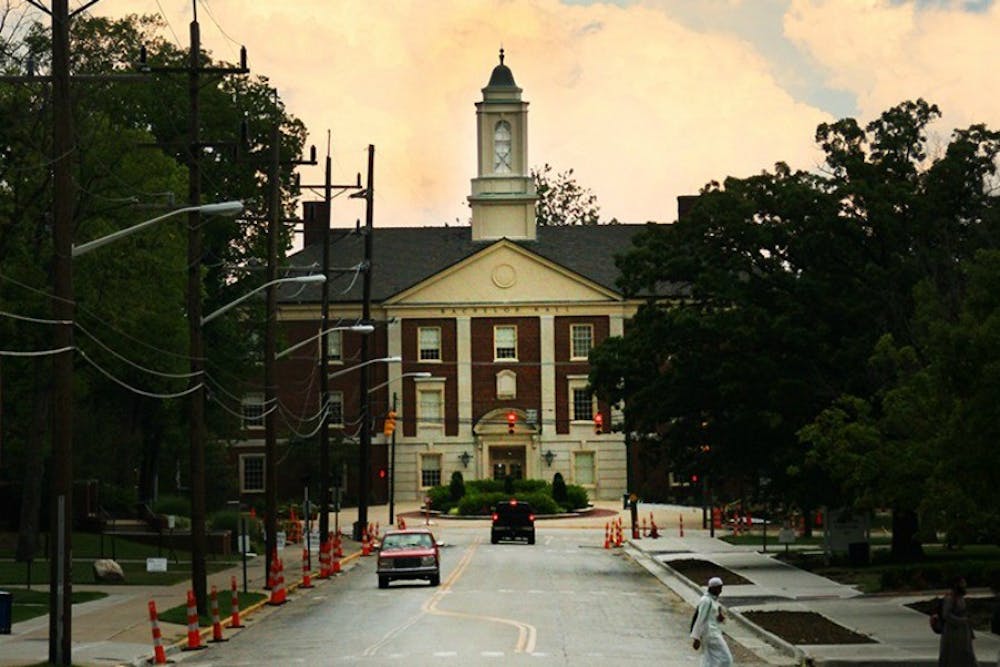By Jacob Bryant, Guest Columnist
With all the respect to Hailey Mallendick and Audrey Davis, writers who covered the AFSME meeting last week, the article covering the events of the AAUP/AFSCME solidarity event largely missed the point of the discussion and its significance. Not only for the AFSCME workers, but also for the entire campus.
I was present at the meeting, representing the AFSCME workers, and am a member of the executive board of union members.
The Miami workers are in a position of petty begging for their sustenance, and their struggle for improved conditions and wages is not only a surface-level fight for these specific improvements.
The real struggle of the union is the struggle to secure and equalize the power relations between the owners of economic implements at Miami among the owners' eternal conflict with the "renters" of these implements, our workers.
The workers entering into a contract with the administration are already at a compromised state. They must attempt to organize a majority of workers into a unified mass, all the while they are divided geographically and barred from spontaneous interactions with the workers from other departments.
The worker's position on campus, their movements and whom they meet with are monitored using paperwork and management collaborative efforts (managers are the allies of administration and are granted easier access to information about the employees).
These divisions, coupled with the overarching class baggage, have made the struggle for fair wages an uphill battle.
The Miami workers make a starting wage of around $10. Now, compared to all the other Ohio Universities, Miami is in the low 10-15 percentile.
According to the 2015 Ohio Bureau of Labor Statistics, the market value in the entire United States is almost $12/hr for the same work, and almost $14/hr for the median wage paid at over half of the Ohio universities.
This is not even the heaviest threat to the security of our laborers. Yes, wages are practical and felt beyond measure, but to truly liberate labor from their shackles attached to the employers banks, forced on them by the pain of poverty birthed for the workers inability to purchase economic implements from the hoarders of these things, we must organize ourselves towards an orientation based on the needs of people, this aim taking priority over individual decadence and gain.
I will elaborate as to why the workers are vulnerable and start by claiming that one needs means to produce wealth to own wealth; seems tautological but it highlights my point. The employing class has a social precedent through their immortal businesses, these businesses are inherited over the years, which continues property hegemony.
To already have an establishment is crucial. The bosses organize themselves better than labor because they already own the implements. By definition, the economic implements are valued by everyone who participates in the process of wealth accumulation because these hold the keys to wealth, therefore these implements are acquired and held onto or set at ungraspable prices. This causes those who are not well off or who historically were marginalized, to rent all they own - their labor, power and time - to the owners of these implements. Recognize for a moment the impact these hidden influences have on social equality.
Can one possibly negotiate a fair contract when the people across the table literally hold the workers' lives in their palms and, at the slightest test, will be happy to close their hand. With the closing of this hand falls away hope for higher wages while dually foisting insurance cost responsibility on the workers and diminishing greater authority to influence policies in the workplace through general democratic organizations.
The driving force of every market actor is to secure as much of the institution's value, meaning watching service costs and leaning up the budget when necessary. This will ensure guaranteed conditions for growth in the business, which is usually the desired method, so businesses can compete in a market. The workers wish to secure as much of the value they created laboring for an institution as possible, without being put out on the street without prospects for a dignified life.
These two principles are an eternal contradiction.
This is the reason for budget cuts that affect workers first; not because of any other reason but additional digits attached to an already six-figure paycheck. Stretching the workforce thin demands greater productive power on each, as I've done myself, and all Miami workers have. We feel that maxim daily. The administrators get the productive power of two, or greater, at a starting price of $10.16/hr. Expansion is the goal of administration, while sustainability and dignity is the goal of the workers. Once the workers are felt as an independent force, with their own interests, as a dignified and autonomous mass, which is recognized as the owners of University's functionality, will justice begin to peek out over the horizon. It will take a fighting consciousness and collaboration with the students and professors AGAINST administration, unwilling to collaborate with anti-social accumulation, to actually see solidarity in a real way.

